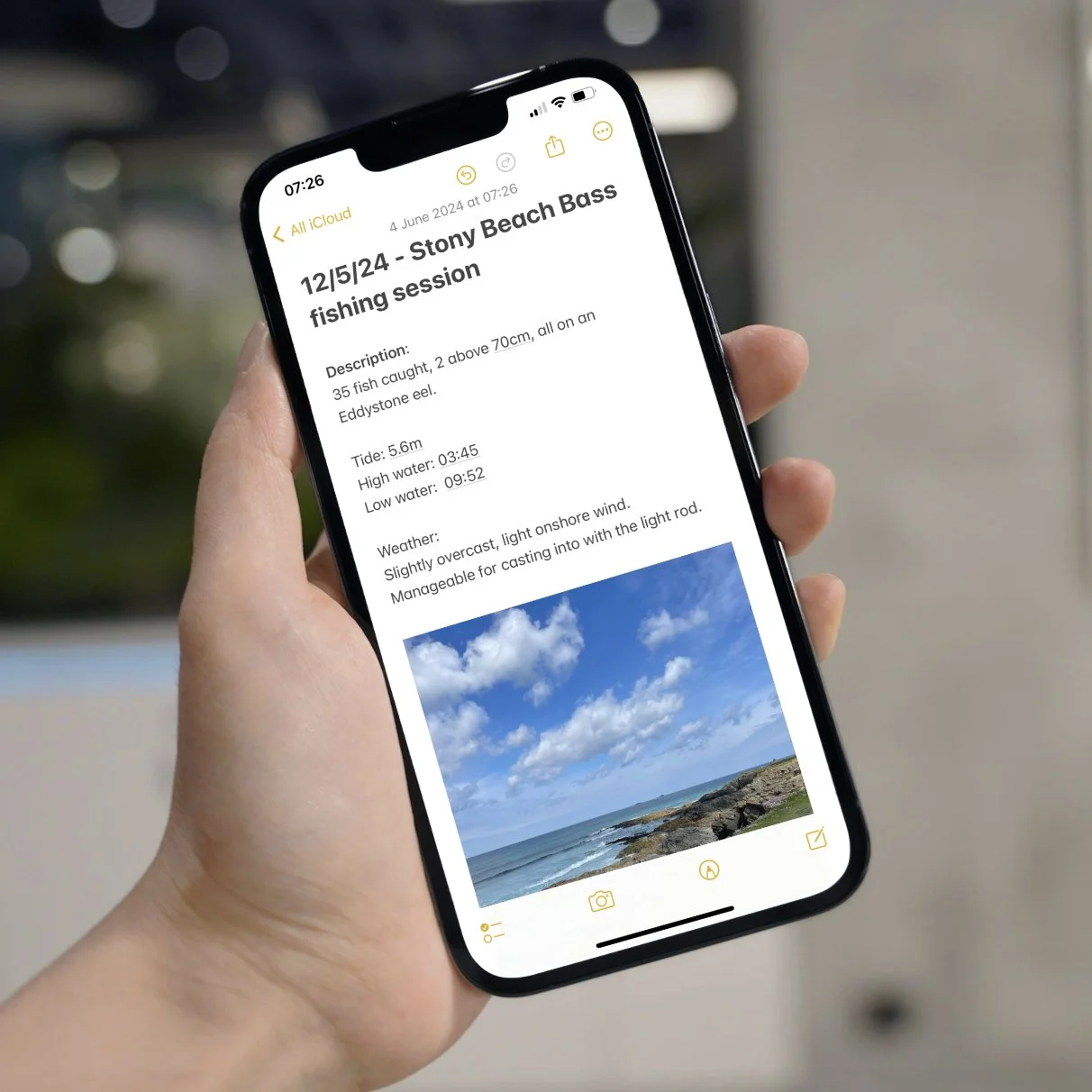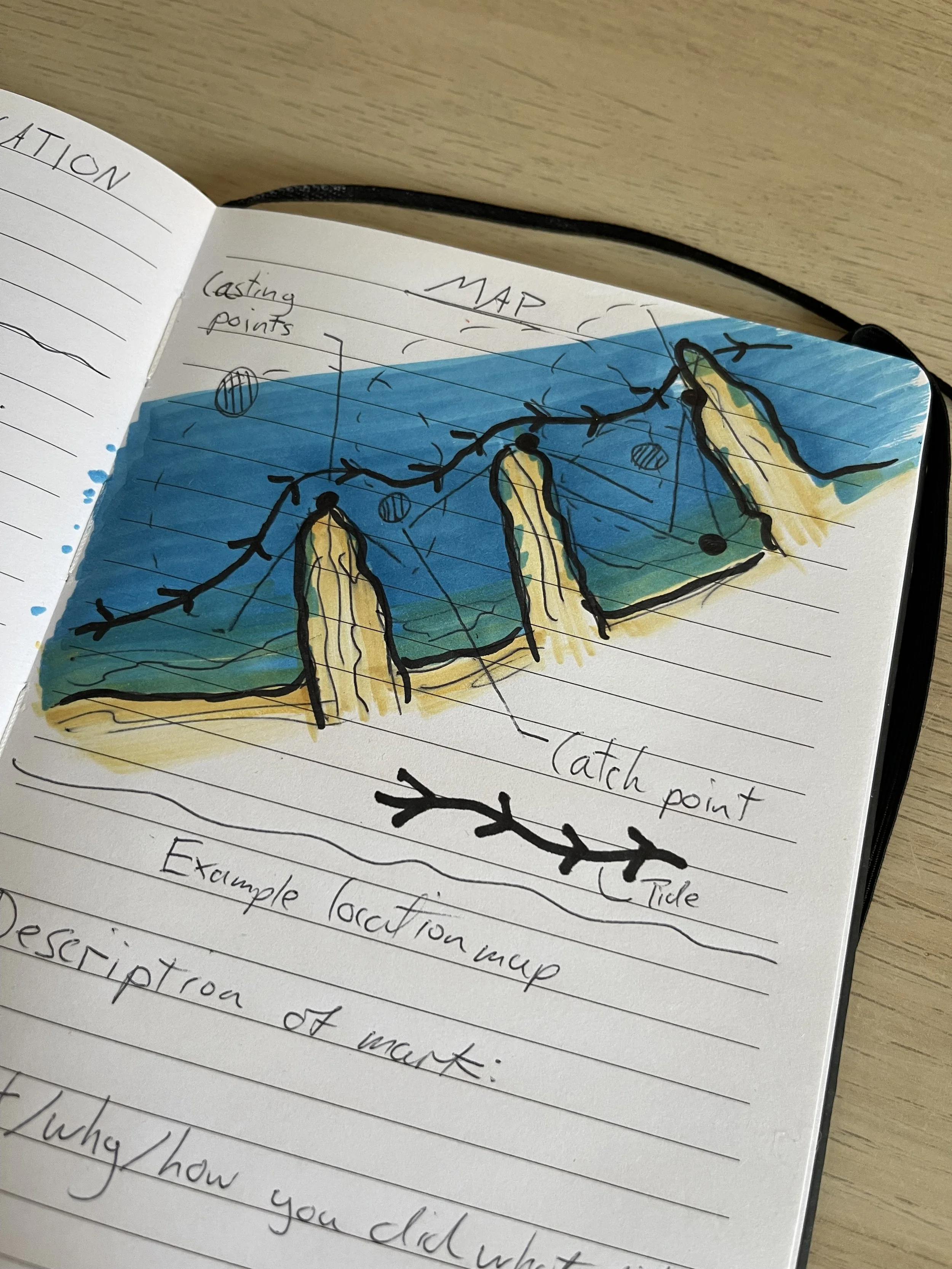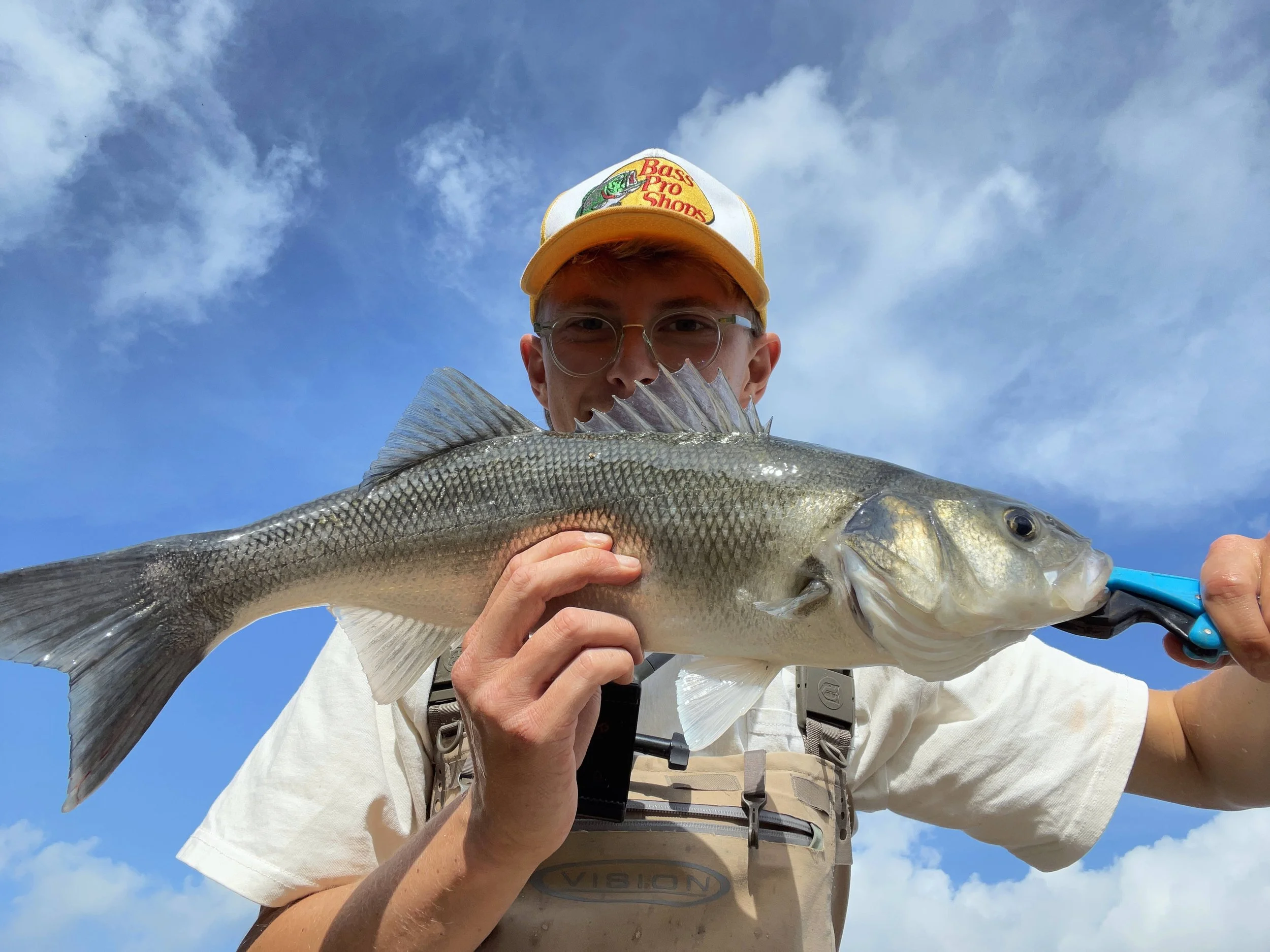Maximise Your Fishing Success: The Ultimate Guide to Keeping a Fishing Log
Summary:
Discover how keeping a fishing log can significantly boost your catch rate and enhance your angling skills. This comprehensive guide for beginners explains the benefits of recording your fishing experiences and provides practical tips on maintaining a fishing diary. Learn what information to log, explore different methods of keeping records, and understand how a detailed log can help you identify patterns and improve your fishing strategy. Whether you're aiming to catch your first fish or beat your personal best, a fishing log is an invaluable tool for any angler.
A Brace of lovely Bass caught one after the other - once you hone in, they can be very obliging to a lure!
Struggling to Catch? Or want to increase your catch size and frequency?
You are not alone! Starting out fishing can be hard, especially in the UK where conditions rarely allow for productive fishing. It took me atleast 2 years to really start catching Bass ‘consistently’.
Many anglers go through the same experience, spending hours fishing with seemingly little to show for the effort.
A fishing log could be your secret weapon. This comprehensive guide will show you why and how to keep a fishing log, helping you catch your first fish, more fish, or even beat your personal best. A fishing log is an invaluable tool for any angler, offering a wealth of information to enhance your fishing sessions.
A fishing log/dairy is what you need to improve your fishing.
If you are looking to catch your first fish, or more fish or even beat your PB, a fishing log is invaluable.
Your log will serve you well as you progress as an angler, giving you heaps of info to look back on when you fish new marks or help you to adjust your approach & technique when times are tough.
My personal fishing log.
More intel = More fish
A fishing log will help you to build a template that you can apply to new marks and continue catching fish.
Filling out a fishing log might seem like an extra chore but it’s so so valuable in the medium to long term.
Your log will take some of the guess work out of fishing & help you identify patterns you might otherwise miss, which could mean catching that PB fish!
After all, you are spending so much time out there, why not try and dial your performance up as far as you can, we only live once!
Why Keeping a Fishing Log is Important
First, a history lesson.
Pattern recognition meant not going hungry for our ancestors.
Our brain is what sets us apart from other animals. Through millennia of evolution, it has developed the ability to recognise patterns and observe repeated behaviours.
For our ancestors to survive, they needed to identify food sources. By observing how the environment influenced the availability of prey, they could detect patterns and develop hunting techniques to exploit these predictable behaviours.
Sadly our neanderthal hunter-gatherer ancestors did not have the luxury of a pen and paper, or an iPhone to drop pins on a map with.. but you do!
You have the tools, and if you are reading this, you are willing to put the effort in to catch a fish.. then you have the will. Let’s crack on!
Your fishing log will help you identify patterns you might otherwise miss
Pattern recognition is crucial to fishing, and your role as an angler is to process incoming information and turn that into catching a fish!
How you process this information is vital, which is where a fishing log comes in to help you make sense of everything that you notice while fishing.
Having a log to register the information you gather in your mind while out fishing, will allow you to pour out your mind onto the paper (or notes app), and reduce the amount of things you’ve got to remember for later when planning your next session.
Uncover patterns, find more fish
When things go well and you caught, you know what to try and repeat next time, be it tide, weather, time of day or many other factors.
And when you don’t catch, you know what to try and avoid.
Often, blanking serves as a stronger lesson than catching as it can guide you to challenge your current thinking and strategy to your fishing, which may lead to fishing new marks and potentially catch a fish.
What if I don’t have a log?
Without a log, you will end up repeating the same approach over and over and end up blanking.
Time is precious, and the little time we get to spend fishing can be maximised by having your intel in order.
Having this info written down will help you to create a template of conditions to aim for and will improve your catch rate over time.
Bass caught with the WSB Demon Bass slayer
How to Maintain an Effective Fishing Log
Top tip:
Record your data as soon as possible after each session to ensure accuracy.
There are three main ways of logging your fishing; A physical notebook, Notes app, Spreadsheet and a bonus method of using your maps app and dropping pins.
Physical notebook
Pros:
High detail level (More valuable)
Can make visual notes, sketch maps & diagrams
Cons:
Hard to retrieve specific information in the future
Labour intensive
From the author
Keeping a physical notebook really helps to me when i first fish a new mark. For the first few sessions on it, Ill commit my findings to paper and it really helps to see what things I could do better in the future., resulting in catching fish!
Notes app
Pros:
Fast and easy, available right on your phone
Reviewable whenever you need it
Searchable content (Very useful)
Cons:
Less detail available than physical notebook
Fast and easy, typing up some notes while you sit in the car after a session ensures you get all the juicy detail in. The bonus is you can search for keywords later and if you write your notes with a key phrase like ‘Productive over high water’ you can search that later when planning a session when high tide is occurring!
Spreadsheet
Pros:
High level of detail
Searchable information
Can produce charts & find trends in your information - Helps you identify patterns
Cons:
Labour intensive
Not really mobile friendly - hard to retrieve info on the fly
Spreadsheets are great as you can fill out as much detail as you want!
These are great to have as a master log and often times Ill have a few scratched up notes in my journal which when I have time & motivation, Ill transfer to the spreadsheet.
Having this level of detail is really helpful for planning sessions or for problem solving when things are slow. Looking back at the previous years expereince may help you to realise it might just be the time of year and the fish arent there, or it might nudge you to try something new, especially if you are repeated last years failures.
For more clarity, you can even format your data with conditional formatting, helping you see important data at a glance.
Dropping pins on your Maps app
Pros:
Fast and easy
Can drop pins on the go so you can remember exactly where to stand in future
Viewable on your mobile
Visual aid to help you plan your fishing sessions
Cons:
Low level of detail
What info should you record?
Keeping it simple is key. Something is better than nothing, so focus on getting a few key bits of info down rather than fill everything but with less detail.
If you are just starting out fishing, just note down the info and keep fishing away, if its not working, reveiw your notes and see what patterns are emerging and tweak your approach!
There are a lot of factors that contribute to a succesful session, particularly with lure fishing where presentation of the lure is dependent on conditions to a finer degree than with bait fishing. This is important to note as the sooner you start paying attention to the conditions at a finer level, the sooner you’ll start to uncover they affect the fishing and ultimately catch.
It’s really important that you take note of the items in the ‘essentials’ list as this will help to guide you when planning fishing sessions as you go along. You might not believe it but fish can be seriously finicky at times and it can often be down to one or two subtle changes such as tide size or clarity of water.
There’s no point burdening yourself with loads of homework to do if it means you wont do it! Only you can can decide wat you feel is important, so experiment and see what works for you. Here is my list of non-negotiables & nice to haves!
Essential
What you NEED to record to make sure you catch fish in the future.
Date
Location
Time of day & session length
Wind
Weather conditions
Water conditions (Clarity, current, rough, calm)
Tide times (Nearest low & high water)
Lures used
Fish caught/or blank
Good to have
If you have time then consider adding these
Tide size (Size between low and high)
Description of the ground (Weedy, Sandy, Rocky etc)
Previous weather conditions (Any rain, hot spell etc)
Pictures
Moon phase
You can add more if you feel necessary
Add any other observations you like and make a note of the fish you caught and what you did leading up to that fish.
Map of your session
Adding a map of your session will help you to see exactly where to stand. This is important as many marks have a particular feature that can access at low tide, or might need a certain amount of tide to get the current moving through a pinch point for example.
Items to include on your maps
Structure type and location
Depth
Current flow
Where you caught
Where you stood & cast
The Impact of a Fishing Log on Your Fishing Results
(Its really helpfu!)
A fishing log can significantly improve your fishing skills and catch rate over time.
By tracking your fishing experiences, you can identify what works and what doesn't, allowing you to refine your strategies.
It can also help you understand the seasonal patterns of different fish species, enabling you to plan your trips during the peak times.
By having a record of what went well, or not so well, you can build a theory behind where fish might be over time.
This means you can look at a tide table months in advance and pencil in dates for sessions at a given mark (fishing location). Having that knowledge is great as it removes indecision and boosts your confidence, which in turn makes you fish better, as you truly believe that it’s inevitable that you’ll catch instead of it just being chance.
This should result in more or bigger fish too, as you begin to refine your marks you can understand if they chuck up bigger fish or not.
It’s important to note though that in the short term, the gains wont be much, but once you have logged a seasons worth of intel, you’ll look back and have a good idea of what to do for the next season, no matter what species you are targeting.
If you want to become an angling expert, a fishing log is one surefire way to develop your skills, have more fun while you are out fishing and catch more fish!
In summary:
Boosts your fishing game
A fishing log helps you get better and catch more fish over time.
Fine-Tunes Your Techniques
By tracking what works and what doesn’t, you can tweak your strategies for better results.
Cracks Seasonal Fish Codes
Learn the seasonal habits of different fish, so you know the best times to head out.
Predicts Fish Locations
Keep records to figure out where fish might be, allowing you to plan ahead with tide tables.
Builds Confidence
Having solid knowledge from your log boosts your confidence, making you a more decisive and successful angler.
Targets Bigger Fish
Use your log to find out which spots produce the biggest catches.
Long-Term Payoff
While short-term gains might be small, a full season of logging will give you great insights for next year.
Essential for Mastering Angling
Want to become an angling expert? A fishing log is your ticket to more fun, more skill, and more fish!
You can only remember so much
Have you ever struggled with not knowing where to fish? I often do! Having a copy of the experiences I have had at each mark and each weather helps me to decide where to fish and hopefully catch.
A log will keep a permanent record of your fishing, outside of your brain, which you can call upon whenever you need, or to help break that blank streak.
You might be hankering after your first fish, or looking to catch a bigger fish and you have so many decisions to make when choosing a mark to fish.
Your log will tell you what conditions you have previously fished, and at what places and at what time. If you caught fish, then plan your session to mimc your previous success and if not, try and come up with another location or approach.
Trying to hold all this info in your mind is hard and will inevitably lead to you forgetting about one of your honey holes and possibly a fish. looking back will help you hone your watercraft and develop as an angler.
Its not just about pure fishing performance its about recording priceless memories.
Fishing time is sacred, and often scarcely available. Looking back at the fish you have caught will bring a massive smile to your face, I know it does for me!
If you’re just starting out, then do write down all the epic moments that you experience!
One day you will look back with a massive grin on your face, looking back at your notes and remembering all of the , amazing places you went and awesome moments you witnessed!
Any angler can attest to that, and to have memory of all those things is truly priceless.
A memorable fish for me - the first fish caught during a competition after only 30 mins of fishing, this came as a great sign as the year before was a shocker!
Want more fishing tips like this?
Sign up for exclusive content, tips, and tricks to take your angling to the next level. Subscribe to our newsletter and never miss an update!
Thanks for reading and I hope you got some value out of this!
Drop a comment with your thoughts, I’d love to hear your approach!
Stay Hooked! 🎣










